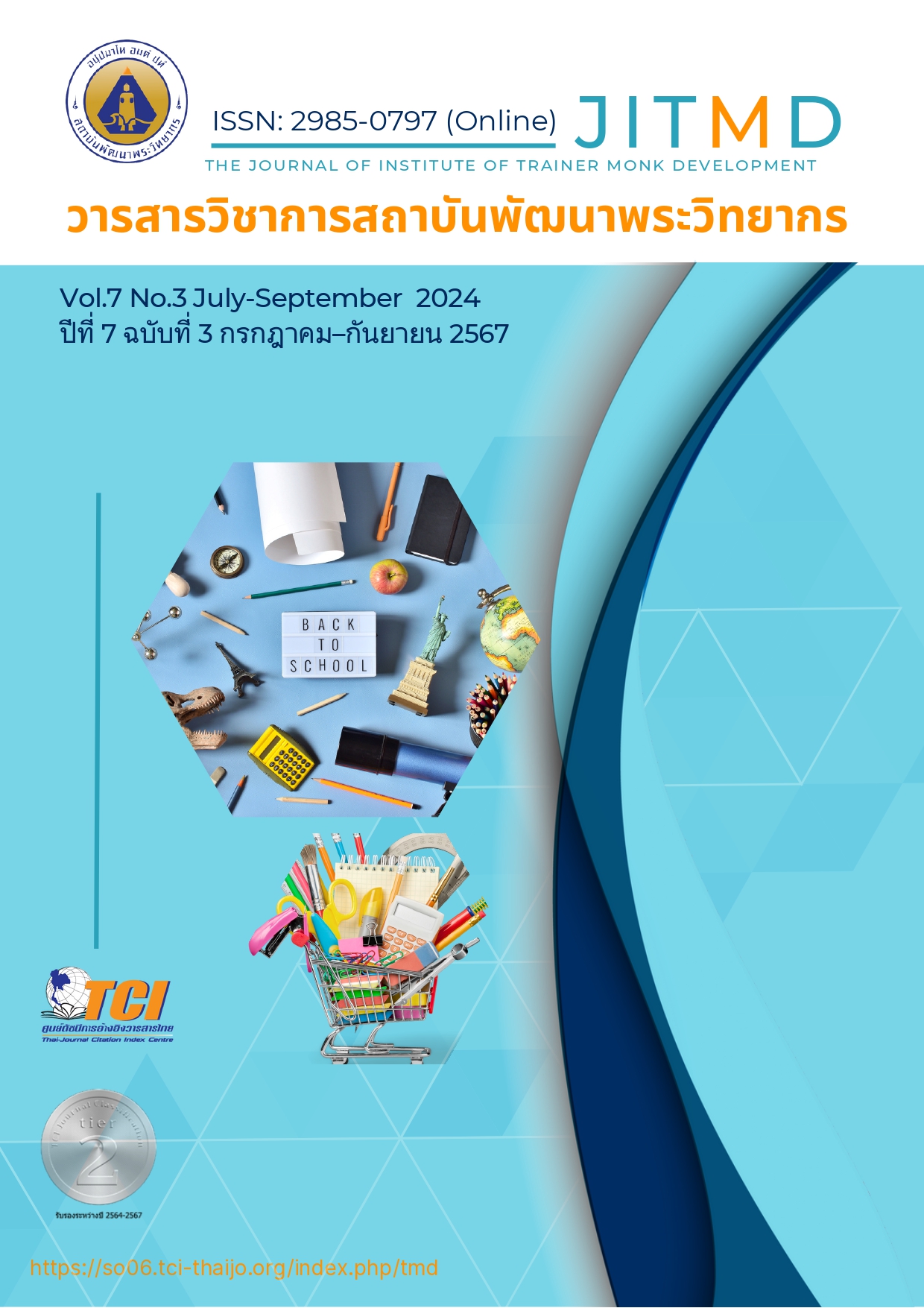Servant Leadership of School Administrators Affecting Modern Organizational Administration Under the Suphan Buri Primary Area Office 1
Main Article Content
Abstract
The purposes of this research were to: 1) study the level of servant leadership of school administrators 2) study the level of the modern organization management administration and 3) analyze servant leadership of school administrators affecting the modern organization administration. The research sample was 270 government teachers under the schools under the Suphan Buri Primary Education Service Area Office 1, derived by proportional stratified random sampling distributed by district. The research instrument used was a questionnaire. Statistics used for data analysis were frequency, percentage, mean, standard deviation, and stepwise multiple regression analysis. The research results were as follows: 1) Overall and in specific aspects, the level servant leadership of administrators was at a high level. The aspects were alignment, empowerment, role model, service mind, and vision, respectively. 2) Overall and in specific aspects, the level of the modern organization administration was at a high level. The aspects were alignment, ability to manage emotions quotient, organizational climate, human behavior analysis, adaptation to the environment and conflict management, respectively. 3) Servant leadership of administrators in the aspects of empowerment (X2), role model (X4), and service mind (X1), were factors affecting the modern organization administration (Ytot) and they collectively predicted the modern organization administration at the percentage of 85.40 with statistical significance level of .01. The regression equation was: tot = 0.45 + 0.78 (X2) + 0.41 (X4) + 0.30 (X1).
Article Details

This work is licensed under a Creative Commons Attribution-NonCommercial-NoDerivatives 4.0 International License.
บทความที่ได้รับการตีพิมพ์เป็นลิขสิทธิ์ของวารสารวิชาการสถาบันพัฒนาพระวิทยากร
ข้อความที่ปรากฎอยู่ในบทความที่ได้รับการตีพิมพ์ในวารสาร ถือเป็นความรับผิดชอบของผู้เขียนบทความ และข้อคิดเห็นนั้นไม่ถือว่าเป็นทัศนะและความรับผิดชอบของกองบรรณาธิการวารสารวิชาการสถาบันพัฒนาพระวิทยากร
References
คมกฤช ประการะสังข์. (2559). ภาวะผู้นำแบบผู้รับใช้ของผู้บริหารสถานศึกษาที่ส่งผลต่อการบริหารแบบมีส่วนร่วมในการบริหารงานของสถานศึกษา สังกัดสำนักงานเขตพื้นที่การศึกษาประถมศึกษาชลบุรี เขต 1. วิทยานิพนธ์ครุศาสตรมหาบัณฑิต สาขาวิชาการบริหารการศึกษา. มหาวิทยาลัยราชภัฏราชนครินทร์.
ธนบดี ศรีโคตร. (2562). สภาพและแนวทางการพัฒนาภาวะผู้นำแบบใฝ่บริการของผู้บริหารสถานศึกษาเอกชน สังกัดสำนักงานเขตพื้นที่การศึกษาประถมศึกษากาฬสินธุ์ เขต 2.วิทยานิพนธ์ครุศาสตรมหาบัณฑิต สาขาวิชาบริหารจัดการการศึกษา. มหาวิทยาลัยราชภัฏมหาสารคาม.
ยงยุทธ สงพะโยม. (2565). กลยุทธ์การบริหารสถานศึกษาในยุคปกติใหม่. วิทยานิพนธ์ปรัชญาดุษฎีบัณฑิต สาขาวิชาการบริหารการศึกษา. มหาวิทยาลัยศิลปากร.
สมคิด บางโม. (2562). องค์การและการจัดการ. กรุงเทพฯ: ซี เอ็ด ยูเคชั่น.
สุพรรณศรี พันธุ์แตง. (2565). ภาวะผู้นำใฝบริการของผู้บริหารสถานศึกษาที่สงผลตอการสร้างองคกร แห่งความสุขในโรงเรียน สังกัดสำนักงานเขตพื้นที่การศึกษา มัธยมศึกษาสุพรรณบุรี.วิทยานิพนธ์ครุศาสตรมหาบัณฑิต สาขาวิชาการบริหารการศึกษา. คณะครุศาสตร์. มหาวิทยาลัยราชภัฏนครปฐม.
สำนักงานคณะกรรมการการศึกษาขั้นพื้นฐาน. (2565). แผนพัฒนาการศึกษาขั้นพื้นฐาน (พ.ศ.2566-2570).กรุงเทพฯ: กระทรวงศึกษาธิการ.
Burns, J.M. (1978). Leadership. New York: Harper and Row.
Ilyukhina & Bogatyreva. (2023). Personnel engagement based on quality standards requirements as a factor in modern organization development. Retrieved [28 May 2022] from https://doi.org/10.1051/e3sconf/202337105021.
Krejcie, R.V., & Morgan, D.W. (1970). Determining Sample Size for Research Activities. Educational and Psychological Measurement, (30)(3): 607-610.


